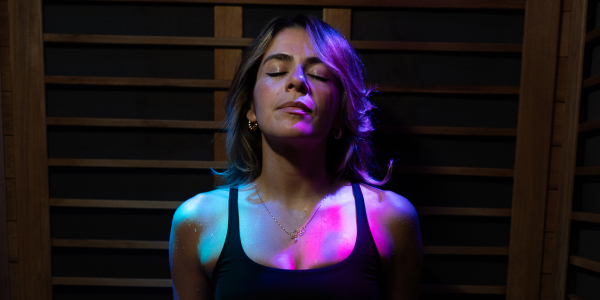From family and work responsibilities to current events, stress is unavoidable. Acute stress, which is experienced in the short term during things like getting stuck in traffic or having to speak in public, thankfully doesn’t stick around. But chronic stress—long-term feelings of anxiety—can have cumulative negative effects on everything from sleep and cognitive function to your physical health—specifically your heart.
Here’s how stress affects heart health and how lifestyle habits and science-backed therapies can help to improve heart health and stress resilience.
How Does Stress Affect Heart Health?
While a racing heart and anxiety might be temporary during an acutely stressful situation, it’s chronic stress that has the greatest impact on your overall cardiovascular health. Studies have found that chronic stress is associated with an increased risk of cardiovascular disease, stroke, coronary heart disease and shorter lifespans.
Stress disrupts the heart’s normal functioning by raising blood pressure, inflammation and cortisol levels, making you more susceptible to cardiac-related diseases. In addition, the emotional toll of chronic stress can result in unhealthy lifestyle practices like tobacco and alcohol use, lack of sleep, poor diet and inadequate physical activity, which can contribute to cardiovascular conditions.
Lifestyle Tips for Stress & Heart Health
While you can’t completely avoid stress, there are some simple lifestyle practices that can help reduce stress levels and support your heart.
Establish an Exercise Routine
Getting at least 150 minutes of moderate-intensity aerobic activity or 75 minutes of vigorous aerobic activity per week, in addition to strength training, has been shown to not only prevent cardiovascular disease but also improve the health of those with heart health issues. It’s also linked to building emotional resilience to stress and reducing stress levels in the body.
Practice Relaxation Techniques
From deep breathing exercises and meditation to yoga and mindfulness exercises, regularly engaging in relaxation techniques has been proven to reduce the cortisol levels associated with the harmful effects of stress.
Prioritize Quality Sleep
Lack of good quality sleep can have negative consequences on both your physical and mental health. Feeling tired not only makes it hard to think clearly and move around, but it also makes it harder to manage stressful situations. If you find it hard to get in the recommended seven to nine hours each night, here are 18 tips to improve your sleep and stress resilience.
Science-Backed Therapies
Along with healthy lifestyle practices, innovative science-backed therapies like Cryotherapy and Infrared Saunas may help not only reduce stress levels and promote relaxation but also contribute to a healthier heart.
Cryotherapy

Cortisol is known as the “stress hormone” and has an effect on nearly every organ and system throughout the body. It also plays a key role in regulating metabolism, inflammation, immunity and stress. When the body is constantly stressed and cortisol levels are elevated, this can result in everything from poor sleep and anxiety to a range of chronic diseases.
Cryotherapy—safely exposing your entire body to sub-zero temperatures in a specialized chamber—has been shown to decrease cortisol levels, improve sleep, lower cholesterol and triglycerides that may contribute to heart disease and also reduce the symptoms of depression and anxiety.
Infrared Sauna

It can be hard to relax when you’re dealing with chronic stress, but Infrared Sauna sessions have been found to help promote stress hormone regulation, relaxation, better sleep, improved mental health and even a longer lifespan.
Curious How it Works?
Red and infrared light penetrates the skin and heats the body from within, triggering a variety of physiological responses that can also decrease cardiovascular diseases. One study from the International Journal of Environmental Research and Public Health found that one or two sauna sessions can improve mitochondrial function and inflammation while three to seven sessions per week can reduce cardiovascular disease development and risks of stroke and hypertension by approximately 50%.
Dial Down the Stress at Restore
Stress is something everyone experiences, but how that stress is managed can have a significant impact on your overall health and well-being. By incorporating healthy lifestyle practices and science-backed therapies, you’re taking proactive steps that both your mind—and your heart—will be grateful for.
Remember: When life starts to feel hectic, Cryotherapy can help you chill out and find some zen, and if you’re feeling burnt out, some Infrared Sauna heat can help you tune in and unwind.
Medical services are provided by an independently-owned physician practice. Some services may require medical clearance and a prescription. We reserve the right to refuse service to anyone. Services, therapies, ingredients and prices may vary per location. The content on our site, blog posts, educational materials, app, promotional newsletters, and any other written content are not intended to replace an evaluation with a qualified healthcare professional and are not intended as medical advice.




%20A%20Better%20Way%20to%20Give%20Your%20%E2%80%A8Body%20NAD%2B.jpg)

